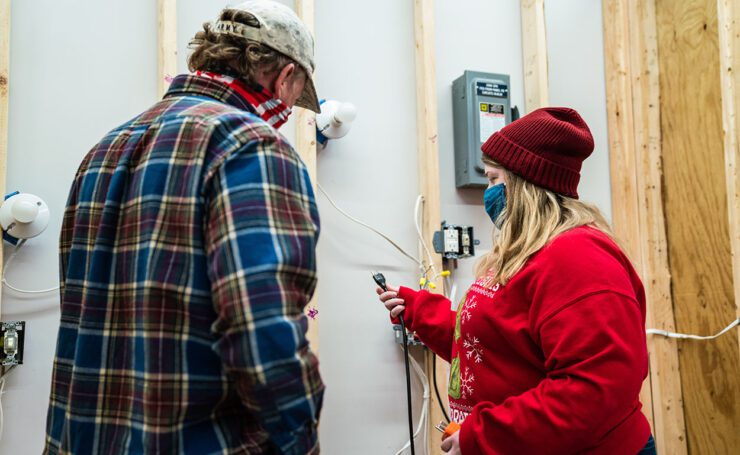Electrical: Installation/Troubleshooting
Course Description
This is an introductory course into the electrical trade. Students will gain theoretical and practical experience in electrical installations and repairs. Upon completion of this course, you will receive a certificate and should have the necessary training for an entry level position with an electrical contractor.
Course Details
- Electrical safety and theory
- NEC Codes
- Electrical Service and Repair
- Electrical Troubleshooting
- Circuit and Equipment installation
The course is taught in a skills lab to allow the student to gain the necessary hands on knowledge to handle the installation or repair of most electrical systems.
There are no prerequisites, but a strong mechanical ability is very important.
Should have the ability to work in a team environment, be organized, detail-oriented, and strong in problem-solving.
Our program technical standards have been developed to help students understand nonacademic standards, skills, and performance requirements expected of a student in order to complete this particular curriculum.
If an accommodation is necessary to participate in the program, it is imperative to identify a reasonable accommodation to those students who qualify under the Americans with Disabilities Act (ADA). Reasonableness is determined by Accessibility Resources and the program on a case-by-case basis utilizing the program technical standards. The accommodation needs to be in place prior to the start of the program, or it may delay your ability to start the program. It is the student’s responsibility to contact Accessibility Resources and request accommodations.
Electrical Technical StandardsCourse Schedule
| Dates | Days | Times | Location | Cost | Units | Course Code |
|---|---|---|---|---|---|---|
| 08/11/2025 - 10/01/2025 10/13/2025 - 12/10/2025 |
Mon, Wed Mon, Wed | 06:00PM - 09:00PM 06:00PM - 09:00PM | GWIL Goodwill Industries 108 GWIL Goodwill Industries 108 | $210.00 | 9.90 | 173865 |
Please Note: There may not be any current course offerings. To be added to a contact list for new course offerings or to reach out for questions about this course, please fill out the form at the bottom of this page and we will contact you to answer your questions.

Electrical service technicians are employed by electrical contractors, repair facilities, hospitals, factories, apartment complexes and other maintenance companies.
Additional Information

How to Register
Interested in this course? You can enroll online by clicking the “Register” link under the course schedule. If you have any issues, please call customer support at 336.734.7023 or fill out the form below.

Student Support
Forsyth Tech has a holistic, wraparound support program to help you. Click to see all the support that is offered.

Contact Us
Need more information? Contact the Program Director James Mitchell by calling 336.734.7771 or email at jtmitchell@forsythtech.edu